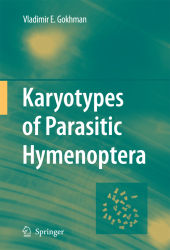 Neuerscheinungen 2016Stand: 2020-02-01 |
Schnellsuche
ISBN/Stichwort/Autor
|
Herderstraße 10
10625 Berlin
Tel.: 030 315 714 16
Fax 030 315 714 14
info@buchspektrum.de |

Vladimir E. Gokhman
Karyotypes of Parasitic Hymenoptera
Softcover reprint of the original 1st ed. 2009. 2016. xiii, 183 S. 235 mm
Verlag/Jahr: SPRINGER NETHERLANDS; SPRINGER 2016
ISBN: 9402404902 (9402404902)
Neue ISBN: 978-9402404906 (9789402404906)
Preis und Lieferzeit: Bitte klicken
The goal of this ground-breaking and updated work is to document the author´s study of the karyotype structure and chromosomal evolution of parasitic Hymenoptera. It also interprets the results obtained for systematic and phylogenetic purposes.
Not so long ago, karyology was considered a vanguard biological discipline, which could solve nearly all problems of systematics and phylogenetics. We liked to believe in the bright future, in a magician who will appear like a Jack-in-the-box and reveal the truth to us. However, excessive hopes related to the chromosomal study came true only in part. In the meantime, new candidates claimed the place of the magician, i. e. phenetics succeeded by cladistics and now by molecular methods in systematics and phylogeny. Nevertheless, it becomes progressively more ob- ous nowadays that cladistics is just a bright envelope for the fairly primitive and theoretically vulnerable approach that deprives living organisms and their groups of the traces of integrity and reduces them to the plain sum of characters. Modern molecular techniques look more perceptive and may yield more reliable results, although the details are sometimes embarrassing, and comparison with the fossil record does not necessarily reveal their superiority over cladistics. These methods are accessible by research teams with massive funding and good equipment and this strongly decreases the range and diversity of the material studied. However, classi?cations are often created by individual systematists with the restricted access to molecular methods. In this context, karyological techniques are in the preferable position, although they certainly do not provide direct and immaculate markers of taxonomic and p- logenetic relationships: chromosomal study is a morphological method with all its advantages and drawbacks.
Chromosomes of Hymenoptera.- Material and Methods.- Morphological Features of Karyotypes of Parasitic Hymenoptera.- Chromosomal Evolution of Parasitic Wasps.- Phylogenetic Implications of Karyotypic Characters of Parasitic Hymenoptera.- Chromosomal Analysis of Parasitic Wasps at Various Taxonomic Levels.
From the reviews: "This book is principally the summary of a large body of work, spanning nearly 25 years, by Vladimir Gokhman [1]. He has carved a niche in karyology of parasitoid wasps and this book has much to offer in the way of chromosome data. The findings are explicitly linked to phylogenetic hypotheses and we are presented with some interesting theories about the evolution of chromosome form and number within the Hymenoptera. ... there are many interesting facts to be gleaned, such as that haploid chromosome numbers for just one family, the ants (Formicidae) range from 1 to 60. ... Some good examples are given in this book. Clearly, karyology has played and still can play an important role in the discrimination of closely related species, but that particular baton has now been taken up by DNA sequencing." Gavin R. Broad in BioMed Central


